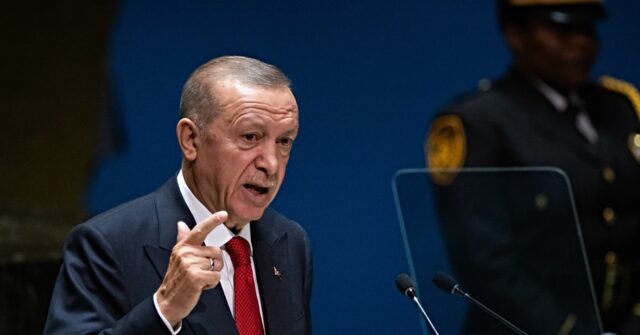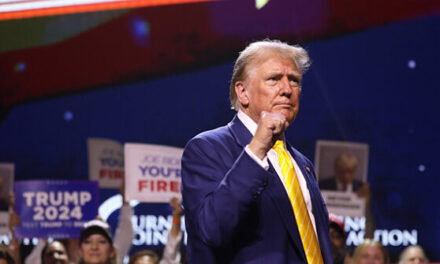We support our Publishers and Content Creators. You can view this story on their website by CLICKING HERE.

Monday marked the eve of the United Nations’ General Assembly’s “general debate,” a unique global event in which the world’s heads of government descend on New York City and receive a platform to discuss any topic of their choosing.
The General Assembly’s high-level debate often attracts some of the world’s most prominent world leaders, both those of the free world and authoritarian leaders. While the world’s most repressive tyrants – North Korea’s Kim Jong-un, China’s Xi Jinping, and Russia’s Vladimir Putin, among others – are sending their foreign ministers and avoiding travel to the United States, several other prominent repressive leaders will address the world from the General Assembly stage.
Among the biggest names already in New York for the event as of Monday are Turkish strongman Recep Tayyip Erdogan, Vietnam’s communist dictator To Lam, Iranian President Masoud Pezeshkian, Indian Prime Minister Narendra Modi, and socialist Brazilian President Luiz Inácio Lula da Silva. Ukrainian President Volodymyr Zelensky and Nepalese communist leader KP Sharma Oli will also be in attendance, as well as British Prime Minister Keir Starmer and French President Emmanuel Macron.
The United Nations is expecting “heads of state, three vice-presidents, two crown princes, 45 heads of government, eight deputy heads of government, 45 ministers, and four lower-ranked heads of a delegation,” Reuters reported last week.
The General Assembly’s general debate consists of a schedule of speeches by country, traditionally beginning with Brazil, followed by host country America. Outgoing leftist American President Joe Biden is expected to address the forum on Tuesday.
The event politely requests that world leaders limit their comments to 15 minutes, a suggestion that dictators routinely, and notoriously, ignore. Every year, the U.N. provides a broad theme to help guide the content of the speeches. This year’s theme is “Leaving No One Behind: Acting Together for the Advancement of Peace, Sustainable Development, and Human Dignity for Present and Future Generations.”
U.N. Secretary-General Antonio Guterres, who traditionally speaks first before the world leaders, has used the weekend prior to the event to pressure countries to adopt what is currently a 56-page international legal document known as the “Pact for the Future,” which would commit member nations to a massive global wealth redistribution plan intended to fund the U.N.’s “Agenda 2030” proposals to end poverty, racism, discrimination against women, and other social maladies.
“We recognize that sustainable development in all its three dimensions is a central goal in itself and that its achievement, leaving no one behind, is and always will be a central objective of multilateralism,” the draft document reads. “We reaffirm our enduring commitment to the 2030 Agenda for Sustainable Development 1 and its Sustainable Development Goals.”
The current iteration of the document presents few actionable proposals rather than vague commitments to “take bold, ambitious, accelerated, just and transformative actions to implement the 2030 Agenda.”
Far from the U.N.’s hope that the “Pact for the Future” will be the centerpiece of the event, world leaders are expected to focus much of their energy on the two most pressing global conflicts currently underway: the war between Israel and jihadist terror groups prompted by Hamas’s slaughter of civilians on October 7, and the decade-old Russian attempts to colonize Ukraine.
Erdogan, the Turkish president, told reporters upon arriving in New York that he would prioritize defending the Hamas stronghold of Gaza from Israel’s self-defense operations in his speech.
“I will specifically touch on joint steps that can be taken against the genocide in Gaza and Israel’s aggressive policies,” Erdogan said, according to the Turkish state-run Anadolu news agency.
The Turkish president has repeatedly insisted that “Hamas is not a terrorist organization” and compared Israeli leaders to Nazi Germany, referring to self-defense operations against Hamas as a “genocide.” Erdogan has not in any meaningful way criticized the unprecedented October 7 terrorist attack, in which Hamas killed an estimated 1,200 people, abducted over 250 people, and engaged in widespread gang rape, torture, and other atrocities.
In an event on Monday, Erdogan also hinted that he would repeat his now-annual complaints against the U.N. Security Council’s system that grants five countries permanent seats: the United States, United Kingdom, China, Russia, and France.
“In every crisis, we witness this bitter reality. On the one hand, there is the U.N. General Assembly and the decisions it takes, reflecting the common conscience and common sense of humanity,” Erdogan said. “On the other hand, there are five privileged countries with veto power in the Security Council.”
RELATED — U.N. Chief Guterres Declares “Terrifying Era of Global Boiling Has Arrived”
United Nations
Also expected to defended Hamas terrorism at the United Nations stage is Iranian President Masoud Pezeshkian, who arrived in New York on Monday.
“Instead of bloodshed, war, and massacres, we should build a world, in which all humans can live comfortably, notwithstanding their color, race, ethnicity, and the region where they live,” Pezeshkian told reporters upon landing. “And unfortunately, the world we are currently living in is not like that. There are some double standards.”
Pezeshkian was inaugurated into the presidency in July after winning a special election following the death of predecessor Ebrahim Raisi in a mysterious helicopter crash. Contrary to Raisi’s reputation of mass murder, Pezeshkian presented himself as a “moderate,” though he has still expressed support for the terrorist war on Israel and pledged fealty to “supreme leader” Ayatollah Ali Khamenei.
In addition to Mideast leaders, Lula, the first world leaders speaking, is expected to oppose Israel’s self-defense operations. Lula, like Erdogan, has compared Israel’s attempts to protect its population from Hamas and other jihadists to Nazi Germany – but, unlike Erdogan, then claimed reporters had lied about his comments.
In remarks on Sunday in New York, Lula claimed that the world body lacked “ambition and boldness.”
The pandemic, conflicts in Europe and the Middle East, the arms race and climate change have thrown open the limitations of multilateral fora”, he said.
Mahmoud Abbas, the head of the West Bank’s Palestinian Authority, is also invited to speak at the event, reportedly scheduled to speak on the same day as Israeli Prime Minister Benjamin Netanyahu.
Outside of the Middle East, the General Assembly is expected to be a major event for Vietnam, whose President and Communist Party Chairman To Lam will become the first Vietnamese communist chief to address the forum.
“The participation of high-level leaders of the Party and State reaffirms, at the highest level, Viet Nam’s foreign policy of independence, self-reliance, multilateralism, diversification, and active, extensive, and effective international integration, Dang Hoang Giang, Vietnam’s top diplomat to the U.N., said this week.
Prior to becoming president in May, To served as minister of public security, a role in which he courted scandal by dining on gilded steaks at a steakhouse owned by Turkish celebrity Nusret “Salt Bae” Gökçe while attending a climate conference in London.
Another prominent communist attending the event is the prime minister of Nepal, KP Sharma Oli, who spoke on Sunday in defense of the “Pact for the Future.”
“Nothing could be more unjust and ethnical than to be ignorant to the fact that millions of people in LDCs [least developed countries] live in extreme poverty while a small minority in some corners of the world accumulate billions in wealth,” Oli proclaimed. “Critically, global financial and trading regimes remain fundamentally unfavourable to LDCs.”
Contrary to the full-throated support from communist Nepal, some attendees rejected the “Pact for the Future.” The government of Argentina, represented at the talks on Sunday by Foreign Minister Diana Mondino, offered an explicit “no” from her libertarian government to the plan.
“Many of the points in this Pact, with its amendments, present reservations and objections or hold back Argentina’s new agenda” under President Javier Milei, Mondino said. “Even so, we proposed constructive actions that were not always taken into question and that leads us to disassociate [from the Pact].”
Milei is in New York and is expected to also address the General Assembly this week.

 Conservative
Conservative  Search
Search Trending
Trending Current News
Current News 







